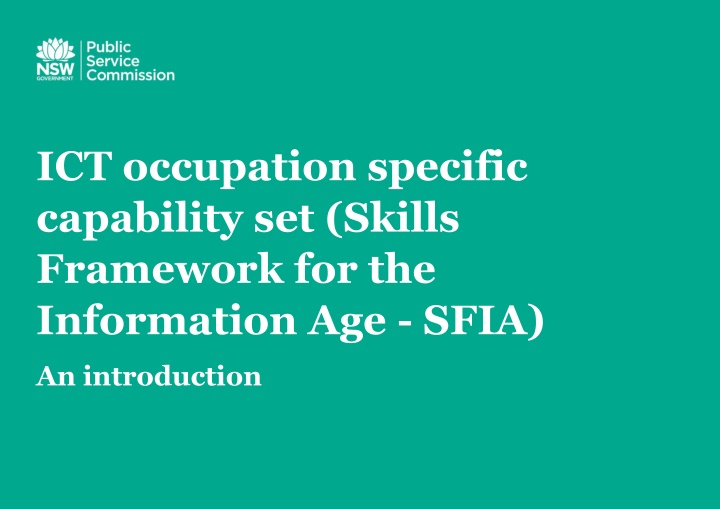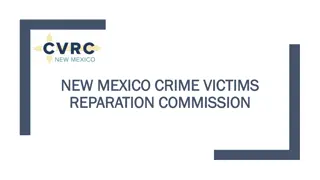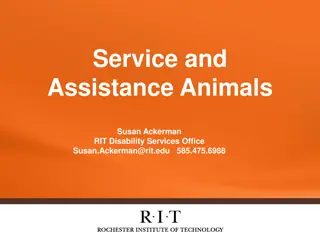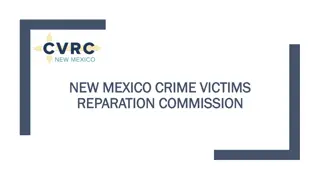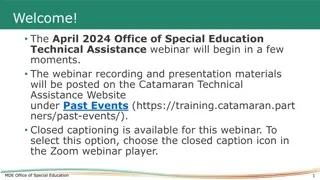Restart New Mexico RFA Technical Assistance Webinar
The Restart New Mexico RFA provides financial resources for short-term training programs preparing New Mexicans for diverse work opportunities leading to immediate employment. The program collaborates with postsecondary institutions to develop boot camps and training programs for in-demand occupations. Participants can receive industry credentials and certificates. The program also focuses on aligning skills with local in-demand occupations and is funded by the Workforce Innovation and Opportunity Act (WIOA) Governor Reserve fund.
Download Presentation

Please find below an Image/Link to download the presentation.
The content on the website is provided AS IS for your information and personal use only. It may not be sold, licensed, or shared on other websites without obtaining consent from the author.If you encounter any issues during the download, it is possible that the publisher has removed the file from their server.
You are allowed to download the files provided on this website for personal or commercial use, subject to the condition that they are used lawfully. All files are the property of their respective owners.
The content on the website is provided AS IS for your information and personal use only. It may not be sold, licensed, or shared on other websites without obtaining consent from the author.
E N D
Presentation Transcript
ICT occupation specific capability set (Skills Framework for the Information Age - SFIA) An introduction
Contents of this Guide o Background overview and key features of the NSW Public Sector Capability Framework (the Capability Framework) and the ICT occupation specific capability set (SFIA) o Features of the Capability Framework o Features of the SFIA o How the Capability Framework and SFIA work together o Applying SFIA to role descriptions o Accessing SFIA
Background o The NSW Public Service Commission has an accredited partner licence to use the Skills Framework for the Information Age (SFIA) as the sector s ICT occupation specific capability set. o The SFIA is intended to be used in conjunction with the NSW Public Sector Capability Framework ( Capability Framework ) to support the full range of workforce management and development activities, including role design and description; recruitment; performance development, learning and development; and strategic workforce planning.
The Capability Framework o The Capability Framework applies to all public sector roles, both executive and non-executive. Every role requires, at an appropriate level, all of the capabilities in the Capability Framework, including the Technology Business Enabler and also the People Management capabilities for roles responsible for managing others.
Overview of the Capability Framework The Capability Framework: o Describes the core knowledge, skills and abilities required of all NSW Public Sector employees, across all levels and occupations o Describes in Plain English, both executive and non-executive capabilities o Describes each capability across progressive levels
Overview of the Capability Framework The Capability Framework: o Reflects the Government Sector Core values o Allows for complementary occupation or profession specific capability sets to be used in conjunction with the Capability Framework o Does not link capability levels to job classification or grade
Capability Groups 16 core capabilities across four groups Four additional capabilities for those roles responsible for managing others
Capabilities and occupation/profession specific capabilities Display Resilience and Courage Communicate Effectively Deliver Results Finance Manage and Develop People ICT occupation specific capability set (SFIA) Act with Integrity Commit to Customer Service Plan and Prioritise Technology Inspire Direction and Purpose Finance Professionals Capability Set Manage Self Work Collaboratively Think and Solve Problems Procurement and Contract Management Optimise Business Outcomes Procurement Professionals Capability Set Value Diversity Influence and Negotiate Demonstrate Accountability Project Management Manage Reform and Change
Background on the Skills Framework for the Information Age (SFIA) The Skills Framework for the Information Age (SFIA) is a globally recognised framework used in over 100 countries The ICT Leadership Group endorsed SFIA as fit for use in the NSW Public Sector in 2012 The Capability Framework and the SFIA has been progressively implemented by a number of agencies via the suite of ICT Sector Role Descriptions
The SFIA at a glance SFIA comprises 97 skills across 6 categories: Strategy and architecture Change and transformation Development and implementation Delivery and operation Skills and quality Relationships and engagement
SFIA levels Each skill entry comprises an overall definition and descriptions of up to seven levels at which the skill might be exercised The seven levels of capability do not apply to all skills, reflecting that some skills are required at entry level, while others kick in at more senior roles.
How the Capability Framework and SFIA work together o The SFIA is a stand-alone Framework; it comprises 97 skills, many of which are effectively described in the Capability Framework. o To avoid duplication, where a skill appears in the SFIA and the Capability Framework, the core capabilities should take precedence. o For example, skills contained in the SFIA that are adequately covered by capabilities from the Capability Framework, include: o IT Strategy and Planning described by the capabilities: Plan and Prioritise, Inspire Direction and Purpose, Work Collaboratively and Communicate Effectively. o Performance Management described by the capabilities: Manage and Develop People and Optimise Business Outcomes.
Applying SFIA in role descriptions The SFIA applies when: When does SFIA apply in role descriptions? the work clearly requires specialised ICT knowledge, skill and/or ability the specialised ICT work occupies a large part of the role the job title is strongly associated with the profession, e.g. Systems Administrator, Enterprise Architect the Primary Purpose , Key Accountabilities and Key Challenges contained in the role description indicate a need for ICT capabilities for successful performance of the role Generally a small subset of capabilities will apply Most roles will require between 3 5 SFIA skills The spread of capability levels for a role should not generally exceed three SFIA levels How many SFIA skills apply? The levels in SFIA do not correspond directly to classifications or grades SFIA will generally only apply to roles above entry level but below agency head A SFIA Capability Comparison Guide is available that provides an indication of the number of SFIA capability levels (as a range) and an outline of the number of focus capabilities (as a range) at each Clerk Grade/Public Service Senior Executive Band At what level does SFIA apply? SFIA describes behaviours, not qualifications. If a qualification, professional membership or certification for a particular product or technology is an essential requirement for the role, this remains a prerequisite for employment and should be reflected in the Essential Requirements section of the role description What about other role requirements, does SFIA describe these?
Accessing SFIA o The SFIA Framework can be accessed via the SFIA Foundation website. Users should register as a corporate user, via their NSW Government email address
More information For more information go to: o Capability Framework o ICT Occupation Specific Capability Set (Skills Framework for the Information Age SFIA) Introductory Guide o SFIA Level Capability Comparison Guide o SFIA Foundation website o Sector role description library Or contact: capabilityframework@psc.nsw.gov.au
